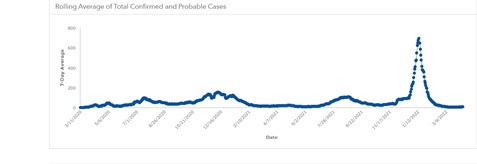The Kansas City, Kansas, Public Schools will go mask-optional on Monday, according to information from the school district.
Because Wyandotte County’s COVID-19 community level is currently low on the CDC rankings, and the Kansas Department of Health and Environment shows Wyandotte County at a moderate level of risk, the mask requirement will be lifted in the public schools beginning Monday, April 25, according to school district information.
Public health officials recommend that anyone with severe medical conditions, symptoms, possible exposure or a positive COVID-19 test wear a mask.
The KCK district respects that some students and staff may choose to continue to wear masks for personal, safety, or other health reasons, the district stated in a post on its website. Those who will be in district buildings are asked to be respectful and supportive of all choices, according to the district’s statement.
The district asked all families and staff to monitor themselves for potential symptoms, such as a new cough, headache, congestion, fever or sore throat.
Those who have symptoms should stay home and contact their supervisor, building nurse or principal, according to the district’s post.
The district will work closely with the Unified Government Health Department to address concerns related to COVID-19, according to the post. The district will be prepared to reinstate a mask requirement if needed, the district stated on its website.
“Our goal remains to keep students and staff safe in our buildings,” the district posted on its website.
A spokesman for the KCK school district stated that the mask requirement is the only change regarding COVID-19 procedures on Monday. There are no other changes to the policy as of Friday.
COVID-19 numbers
The Unified Government’s COVID-19 webpage reported 39,921 total cumulative cases on Friday, April 22, with 500 total cumulative deaths.
The University of Kansas Health System reported treating a total of 25 COVID patients on Friday morning, April 22. There were nine patients with the active virus on Friday, an increase of three from Thursday, according to the report. There were two COVID patients in the intensive care unit, the same as Thursday, with one on a ventilator, an increase of one since Thursday. There were another 16 COVID patients hospitals who were out of the acute infection phase, no change from Thursday.
Vaccinations
The Unified Government Health Department reported on its Facebook page that there will be COVID vaccinations from 4 p.m. to 7 p.m. Monday, April 25, at The Merc Co+Op store, 501 Minnesota Ave., Kansas City, Kansas. The vaccinations are through Swope Health.
The KCK school district has scheduled a COVID vaccine event from 4 p.m. to 6 p.m. Wednesday, April 27, at Grant Elementary School, 1510 N. 4th St., Kansas City, Kansas. Those who are age 5 and up will be eligible to receive a first dose of Pfizer vaccine, or a second dose of Pfizer vaccine. Those who are 18 and older may receive a first dose of Pfizer vaccine, second dose of Pfizer vaccine, a first booster shot 5 months after the second dose, or a second booster shot four months after the last booster shot.
Masks are required at the vaccine event, and parents or guardians should be present for those 5-17. Those receiving a second dose or booster should bring their vaccination cards. Those who receive the vaccine will be given a free ticket to eat at one of the food trucks at the site.

